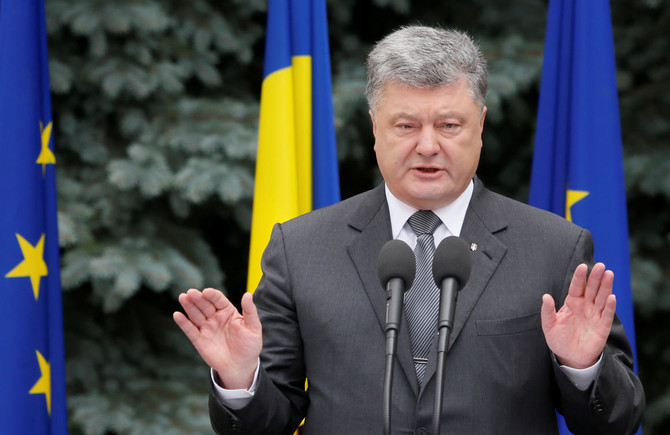KIEV: Ukrainian President Petro Poroshenko on Monday insisted Russia must be held to account over the downing of Malaysia Airlines flight MH17, three years on from the tragedy that killed 298 people.
International investigators have said the Boeing airliner flying from Amsterdam to Kuala Lumpur was blown out of the sky over conflict-wracked east Ukraine on July 17, 2014 by a Buk missile system brought in from Russia and fired from territory held by Moscow-backed rebels.
The probe being led by The Netherlands — which suffered the majority of losses — is focusing on some 100 people suspected of having played an “active role” in the incident, but the investigators have not publicly named any suspects.
The West and Kiev are adamant that all the evidence points to the insurgents and Moscow.
Russia and the separatist authorities it supports, however, continue to deny any involvement and have sought repeatedly to deflect the blame onto Ukraine.
“It was a barefaced crime that could have been avoided if not for the Russian aggression, Russian system and Russian missile that came from Russian territory,” Poroshenko wrote on Facebook.
“Our responsibility before the dead and before future generations is to show to the aggressor terrorists that responsibility is unavoidable for all the crimes committed.”
Officials announced this month that the trials of any suspects arrested over the shooting down of MH17 will be held in the Netherlands.
The countries leading the joint investigation — Australia, Belgium, Malaysia, The Netherlands and Ukraine — agreed that any trials will be carried out within the Dutch legal system.
Poroshenko said that he was “convinced that the objectivity and impartiality of Dutch justice will complete this path.”
“It is our shared duty in the face of the memory of those whose beating hearts were stopped exactly three years ago by a Russian missile,” he wrote.
No official events are planned in Kiev to mark the third anniversary but local residents are expected to gather for a small religious ceremony at the crash site in rebel-held territory.
Russia and Ukraine have been locked in a bitter feud since Moscow seized the Black Sea peninsula of Crimea in 2014 after the ouster of a Kremlin-backed leader by pro-Western protesters in Kiev.
Moscow was then accused of masterminding and fueling a separatist conflict in two other eastern regions that has cost the lives of some 10,000 people in over three years.
Russia insists it has not sent troops and weapons to fight in Ukraine despite overwhelming evidence that Moscow has essentially been involved in an undeclared war.
Ukraine wants Russia held to account over MH17 downing
Ukraine wants Russia held to account over MH17 downing

France’s Le Pen insists party acted in ‘good faith’ at EU fraud appeal

- Le Pen said on her second day of questioning that even if her party broke the law, it was unintentional
- She also argued that the passage of time made it “extremely difficult” for her to prove her innocence
PARIS: French far-right leader Marine Le Pen told an appeals trial on Wednesday that her party acted in “good faith,” denying an effort to embezzle European Parliament funds as she fights to keep her 2027 presidential bid alive.
A French court last year barred Le Pen, a three-time presidential candidate from the far-right National Rally (RN), from running for office for five years over a fake jobs scam at the European institution.
It found her, along with 24 former European Parliament lawmakers, assistants and accountants as well as the party itself, guilty of operating a “system” from 2004 to 2016 using European Parliament funds to employ party staff in France.
Le Pen — who on Tuesday rejected the idea of an organized scheme — said on her second day of questioning that even if her party broke the law, it was unintentional.
“We were acting in complete good faith,” she said in the dock on Wednesday.
“We can undoubtedly be criticized,” the 57-year-old said, shifting instead the blame to the legislature’s alleged lack of information and oversight.
“The European Parliament’s administration was much more lenient than it is today,” she said.
Le Pen also argued that the passage of time made it “extremely difficult” for her to prove her innocence.
“I don’t know how to prove to you what I can’t prove to you, what I have to prove to you,” she told the court.
Eleven others and the party are also appealing in a trial to last until mid-February, with a decision expected this summer.
- Rules were ‘clear’ -
Le Pen was also handed a four-year prison sentence, with two years suspended, and fined 100,000 euros ($116,000) in the initial trial.
She now again risks the maximum sentence of 10 years in prison and a one-million-euro ($1.16 million) fine if the appeal fails.
Le Pen is hoping to be acquitted — or at least for a shorter election ban and no time under house arrest.
On Tuesday, Le Pen pushed back against the argument that there was an organized operation to funnel EU funds to the far-right party.
“The term ‘system’ bothers me because it gives the impression of manipulation,” she said.
EU Parliament official Didier Klethi last week said the legislature’s rules were “clear.”
EU lawmakers could employ assistants, who were allowed to engage in political activism, but this was forbidden “during working hours,” he said.
If the court upholds the first ruling, Le Pen will be prevented from running in the 2027 election, widely seen as her best chance to win the country’s top job.
She made it to the second round in the 2017 and 2022 presidential polls, before losing to Emmanuel Macron. But he cannot run this time after two consecutive terms in office.











